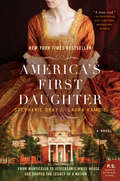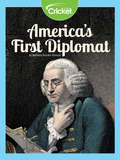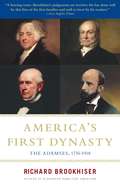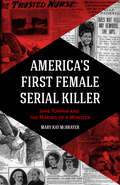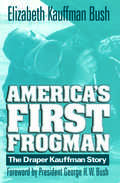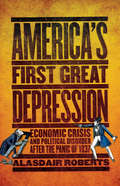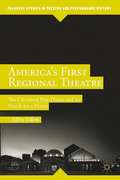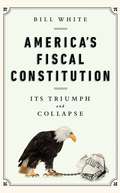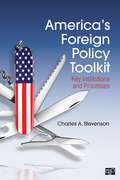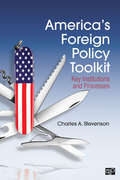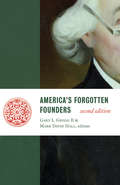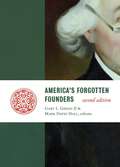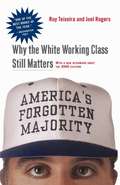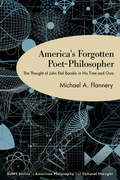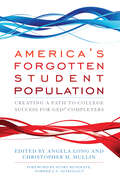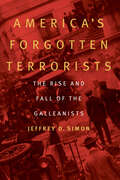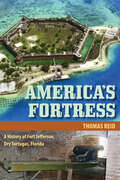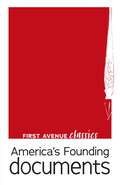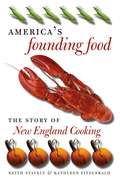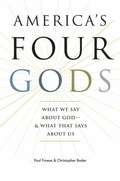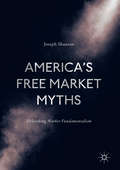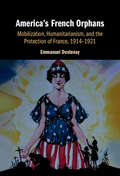- Table View
- List View
America's First Daughter
by Stephanie Dray Laura KamoieIn a compelling, richly researched novel that draws from thousands of letters and original sources, bestselling authors Stephanie Dray and Laura Kamoie tell the fascinating, untold story of Thomas Jefferson's eldest daughter, Martha "Patsy" Jefferson Randolph--a woman who kept the secrets of our most enigmatic founding father and shaped an American legacy.<P><P> From her earliest days, Patsy Jefferson knows that though her father loves his family dearly, his devotion to his country runs deeper still. As Thomas Jefferson's oldest daughter, she becomes his helpmate, protector, and constant companion in the wake of her mother's death, traveling with him when he becomes American minister to France.<P> It is in Paris, at the glittering court and among the first tumultuous days of revolution, that fifteen-year-old Patsy learns about her father's troubling liaison with Sally Hemings, a slave girl her own age. Meanwhile, Patsy has fallen in love--with her father's protégé William Short, a staunch abolitionist and ambitious diplomat. Torn between love, principles, and the bonds of family, Patsy questions whether she can choose a life as William's wife and still be a devoted daughter.<P> Her choice will follow her in the years to come, to Virginia farmland, Monticello, and even the White House. And as scandal, tragedy, and poverty threaten her family, Patsy must decide how much she will sacrifice to protect her father's reputation, in the process defining not just his political legacy, but that of the nation he founded. <P><b>A New York Times Bestseller</b>
America's First Diplomat
by Barbara Brooks SimonsDo you know who Benjamin Franklin is? You might know him as the scientist who discovered electricity by tying a key to a kite during a storm! Did you know he was a founding father of the United States? He made many efforts to the Revolutionary War and the construction of the United States government. Learn about all the political contributions he made that helped create the United States!
America's First Dynasty: The Adamses, 1735-1918
by Richard BrookhiserRichard Brookhiser has won a wide and loyal following for his stylish, pointed, and elegant biographies of George Washington and Alexander Hamilton. In America's First Dynasty,Brookhiser tells the story of America's longest and still greatest dynasty- the Adamses, the only family in our history to play a leading role in American affairs for nearly two centuries. From John, the self-made, tough-minded lawyer who rose to the highest office in the government he helped create; to John Quincy, the child prodigy who grew up amid foreign royalty, followed his father to the White House, and later reinvented himself as a champion of liberty in Congress; to politician and writer Charles Francis, the only well-balanced Adams; to Henry, brilliant scholar and journalist- the Adamses achieved longer-lasting greatness than any other American family. Brookhiser's canvass starts in colonial America, when John Adams had to teach himself the law and ride on horseback for miles to find clients. It does not end until after the Titanic sinks- Henry had booked a room but changed his plans- and World War I begins, with Henry near the action in France. The story of this single family offers a short course in the nation's history, because for nearly two hundred years Adams history was American history. The Adamses were accompanied by an impressive cast of characters, from George Washington and Thomas Jefferson, to Andrew Jackson and Ulysses Grant, to Teddy Roosevelt. America's First Dynasty offers telling portraits of the great men of our past, and many of the women around them. John and Abigail's great love affair was destined to be repeated by their offspring and offspring's offspring. As with any family, there was a darker side to the Adams story: many of its members were abject failures. Alcoholism was a familiar specter, and suicide was not unknown. Only one of the four great Adamses was a kind man and father; the others set standards so impossibly high that few of their children could meet them. Yet despite more than a century of difference from John to Henry, certain Adams traits remained the same. In the story of our first and still-greatest family, we can all see something of our own struggles with family, fate, and history.
America's First Female Serial Killer: Jane Toppan and the Making of a Monster
by Mary Kay McBrayerThis is Capote’s In Cold Blood for serial killer enthusiasts: meticulously researched, superbly written, and incredibly vivid. Don’t miss it.” —Gabino Iglesias, author of Coyote SongsAmerica’s First Female Serial Killer novelizes the true story of first-generation Irish-American nurse Jane Toppan, born as Honora Kelley. Although all the facts are intact, books about her life and her crimes are all facts and no story. Jane Toppan was absolutely a monster, but she did not start out that way.When Jane was a young child, her father abandoned her and her sister to the Boston Female Asylum. From there, Jane was indentured to a wealthy family who changed her name, never adopted her, wrote her out of the will, and essentially taught her how to hate herself. Jilted at the altar, Jane became a nurse and took control of her life—and the lives of her victims.“A thoughtful and inspired take on one of the greatest poisoners in history. America’s First Female Serial Killer: Jane Toppan and the Making of a Monster seethes with rage, compulsion, and a righteous condemnation of the servitude of the underclass. A chilling and sobering read.” —Robert Levy, author of The Glittering World“McBrayer offers us a complex—and terrifying—portrait of a killer who seemed almost doomed from birth.” —Kate Winkler Dawson, author of American Sherlock: Murder, Forensics, and the Birth of American CSI“Brings the horrifying true story of Jane Toppan to lurid, novelistic life, and forces the reader face-to-face with the thoughtlessness and cruelty that helped turn a gifted, damaged child into one of America’s most legendary killers.” —Shaun Hamill, author of A Cosmology of Monsters
America's First Frogman
by Elizabeth Kauffman BushAlthough bad eyesight kept him from receiving a commission in the U.S. Navy when he graduated from the Naval Academy in 1933, Draper Kauffman became a hero of underwater demolition in World War II and went on to a distinguished naval career. Today Admiral Kauffman is remembered as the nation's first frogman and the father of the Navy Seals. His spectacular wartime service disarming enemy bombs, establishing bomb disposal schools, and organizing and leading the Navy's first demolition units is the focus of this biography written by Kauffman's sister. Elizabeth Kauffman Bush, who also is the aunt of President George W. Bush, draws on family papers as well as Navy documents to tell Kauffman's story for the first time. Determined to defend the cause of freedom long before the U.S. ever entered the war, Kauffman was taken prisoner by the Germans as an ambulance driver in France, and after his release joined the Royal Navy to defuse delayed-action bombs during the London blitz. After Pearl Harbor his eyes were deemed adequate and he was given a commission in the U.S. Naval Reserve. With his experience, he was asked to establish an underwater demolition school in Fort Pierce, Florida, where he personally trained men to defuse bombs and neutralize other submerged dangers. His men were sent to demolish the obstacles installed by the Nazis at Normandy, and Kauffman himself led underwater demolition teams in the Pacific at Saipan, Tinian, and Guam and later directed UDT operations at Iwo Jima and Okinawa. His men remember him as an exceptional leader who led by example. He trained and fought alongside them, impervious to danger. Because of the high standards he set for those who became "frogmen,"thousands of American lives were saved in World War II, Korea, and Vietnam. Draper Kauffman's early established UDT traditions of perseverance, teamwork, and a lasting brotherhood of men of extraordinary courage is carried on by Navy Seals. This is his legacy to the U.S. Navy and his country.
America's First Great Depression: Economic Crisis and Political Disorder after the Panic of 1837
by Alasdair RobertsFor a while, it seemed impossible to lose money on real estate. But then the bubble burst. The financial sector was paralyzed and the economy contracted. State and federal governments struggled to pay their domestic and foreign creditors. Washington was incapable of decisive action. The country seethed with political and social unrest. In The First Great Depression, Alasdair Roberts describes how the United States dealt with the economic and political crisis that followed the Panic of 1837. As Roberts shows, the two decades that preceded the Panic had marked a democratic surge in the United States. However, the nation's commitment to democracy was tested severely during this crisis. Foreign lenders questioned whether American politicians could make the unpopular decisions needed on spending and taxing. State and local officials struggled to put down riots and rebellion. A few wondered whether this was the end of America's democratic experiment. Roberts explains how the country's woes were complicated by its dependence on foreign trade and investment, particularly with Britain. Aware of the contemporary relevance of this story, Roberts examines how the country responded to the political and cultural aftershocks of 1837, transforming its political institutions to strike a new balance between liberty and social order, and uneasily coming to terms with its place in the global economy.
America's First Regional Theatre
by Jeffrey UllomThe Cleveland Play House has mirrored the achievements and struggles of both the city of Cleveland and the American theatre over the past one hundred years. This book challenges the established history (often put forward by the theatre itself) and long-held assumptions concerning the creation of the institution and its legacy.
America's Fiscal Constitution: Its Triumph and Collapse
by Bill WhiteWhat would Washington, Jefferson, Madison, Lincoln, the Roosevelts, Truman, and Eisenhower have done about today's federal debt crisis?America's Fiscal Constitution tells the remarkable story of fiscal heroes who imposed clear limits on the use of federal debt, limits that for two centuries were part of an unwritten constitution. Those national leaders borrowed only for extraordinary purposes and relied on well-defined budget practices to balance federal spending and revenues. That traditional fiscal constitution collapsed in 2001. Afterward-for the first time in history-federal elected officials cut taxes during war, funded permanent new programs entirely with debt, grew dependent on foreign creditors, and claimed that the economy could not thrive without routine federal borrowing.For most of the nation's history, conservatives fought to restrain the growth of government by insisting that new programs be paid for with taxation, while progressives sought to preserve opportunities for people on the way up by balancing budgets. Virtually all mainstream politicians recognized that excessive debt could jeopardize private investment and national independence.With original scholarship and the benefit of experience in finance and public service, Bill White dispels common budget myths and distills practical lessons from the nation's five previous spikes in debt. America's Fiscal Constitution offers an objective and hopeful guide for people trying to make sense of the nation's current, most severe, debt crisis and its impact on their lives and our future.
America's Flag Story
by Karen S. RobbinsThe American flag waves in reverence for many—for the immigrants who came and built a nation with hard work and ingenuity and for all who continue to defend and serve our nation. The verse and artwork resonate with the symbolism that represents the very characteristics of our nation and offers young readers a clear understanding of how one part of our country says so much. The flag represents the freedom, the endurance, and the indomitable courage that makes America the home of the free and brave.
America's Foreign Policy Toolkit: Key Institutions and Processes
by Charles A. StevensonIn this book, Charles A. Stevenson identifies for students what the key foreign policy tools are, clarifies which tools are best for which tasks, describes the factors that constrain or push how they're used, and provides fresh insight into the myriad challenges facing national security decisionmakers.
America's Foreign Policy Toolkit: Key Institutions and Processes
by Charles A. StevensonHow is foreign policy in the United States really crafted? In America's Foreign Policy Toolkit, Charles A. Stevenson identifies what the key foreign policy tools are, which are best for which tasks, and what factors constrain or push how they're used, bringing fresh insight into the challenges facing national security decisionmakers. Engagingly written with examples drawn from "behind the scenes," Stevenson brings depth and dimension to the institutions and processes of foreign policy. This brief text looks first at the historical context and then in turn at the tools available to the president and congress, and to the shared budgetary tools. The following section surveys each of the diplomatic, economic, military, intelligence, homeland security, and international institutions instruments. The book concludes by considering the limitations of the U.S. toolkit. Each chapter ends with a case study that connects the theory of the toolkit with the realities of decisionmaking.
America's Forgotten Constitutions
by Robert L. TsaiThe U. S. Constitution opens by proclaiming the sovereignty of all citizens: "We the People. " Robert Tsai's gripping history of alternative constitutions invites readers into the circle of those who have rejected this ringing assertion--the defiant groups that refused to accept the Constitution's definition of who "the people" are and how their authority should be exercised. America's Forgotten Constitutions is the story of America as told by dissenters: squatters, Native Americans, abolitionists, socialists, internationalists, and racial nationalists. Beginning in the nineteenth century, Tsai chronicles eight episodes in which discontented citizens took the extraordinary step of drafting a new constitution. He examines the alternative Americas envisioned by John Brown (who dreamed of a republic purged of slavery), Robert Barnwell Rhett (the Confederate "father of secession"), and Etienne Cabet (a French socialist who founded a utopian society in Illinois). Other dreamers include the University of Chicago academics who created a world constitution for the nuclear age; the Republic of New Afrika, which demanded a separate country carved from the Deep South; and the contemporary Aryan movement, which plans to liberate America from multiculturalism and feminism. Countering those who treat constitutional law as a single tradition, Tsai argues that the ratification of the Constitution did not quell debate but kindled further conflicts over basic questions of power and community. He explains how the tradition mutated over time, inspiring generations and disrupting the best-laid plans for simplicity and order. Idealists on both the left and right will benefit from reading these cautionary tales.
America's Forgotten Founders, second edition
by Gary L Gregg II Mark David HallEven as Americans devour books about our Founding Fathers, the focus seldom extends past a half dozen or so icons--Franklin, Washington, Adams, Jefferson, Madison, Hamilton. Many of the men (and women) who made prodigious contributions to the American founding have been all but forgotten. America's Forgotten Founders corrects this injustice. Editors Gary L. Gregg II and Mark David Hall surveyed forty-five top scholars in history, political science, and law to produce the first-ever ranking of the most neglected contributors to the American Revolution and our constitutional order. This unique book features engaging short biographies of the top ten most important Founders whose contributions are overlooked today: James Wilson, George Mason, Gouverneur Morris, John Jay, Roger Sherman, John Marshall, John Dickinson, Thomas Paine, Patrick Henry, and John Witherspoon.The latest entry in ISI Books' Lives of the Founders series, America's Forgotten Founders reshapes our understanding of America's founding generation.
America's Forgotten Founders, second edition (Lives of the Founders)
by Mark David Hall Gary L. GreggBeyond Washington and Jefferson: Ranking the Founders. Even as Americans devour books about our Founding Fathers, the focus seldom extends past a half dozen or so icons—Franklin, Washington, Adams, Jefferson, Madison, Hamilton. Many of the men (and women) who made prodigious contributions to the American founding have been all but forgotten. America's Forgotten Founders corrects this injustice. Editors Gary L. Gregg II and Mark David Hall surveyed forty-five top scholars in history, political science, and law to produce the first-ever ranking of the most neglected contributors to the American Revolution and our constitutional order. This unique book features engaging short biographies of the top ten most important Founders whose contributions are overlooked today: James Wilson, George Mason, Gouverneur Morris, John Jay, Roger Sherman, John Marshall, John Dickinson, Thomas Paine, Patrick Henry, and John Witherspoon. Part of the "Lives of the Founders" series, America's Forgotten Founders reshapes our understanding of America's founding generation.
America's Forgotten Majority: Why the White Working Class Still Matters
by Ruy Teixeira Joel RogersA powerful look at the real America, dominated by America's "forgotten majority"-white working-class men and women who make up 55 percent of the voting population
America's Forgotten Pandemic
by Alfred W. CrosbyBetween August 1918 and March 1919 the Spanish influenza spread worldwide, claiming over 25 million lives, more people than those perished in the fighting of the First World War. It proved fatal to at least a half-million Americans. Yet, the Spanish flu pandemic is largely forgotten today. In this vivid narrative, Alfred W. Crosby recounts the course of the pandemic during the panic-stricken months of 1918 and 1919, measures its impact on American society, and probes the curious loss of national memory of this cataclysmic event. In a new edition, with a new preface discussing the recent outbreaks of diseases, including the Asian flu and the SARS epidemic, America's Forgotten Pandemic remains both prescient and relevant. Alfred W. Crosby is a Professor Emeritus in American Studies, History and Geography at the University of Texas at Austin, where he taught for over 20 years. His previous books include Throwing Fire (Cambrige, 2002), the Measure of Reality (Cambridge, 1997) and Ecological Imperialism (cambridge, 1986). Ecological Imperialism was the winner of the 1986 Phi Beta Kappa book prize. The Measure of Reality was chosen by the Los Angeles Times as one of the 100 most important books of 1997.
America's Forgotten Poet-Philosopher: The Thought of John Elof Boodin in His Time and Ours (SUNY series in American Philosophy and Cultural Thought)
by Michael A. FlanneryThis book examines the ideas and influences of a nearly forgotten Swedish-American philosopher, John Elof Boodin (1869–1950). A friend and student of William James and protégé of Josiah Royce at Harvard, Boodin combined Jamesian pragmatism and Roycean idealism in developing original scholarship (nearly sixty articles and eight books) from 1900 to 1947, in addition to a volume of posthumous papers published in 1957. Although he is seldom remembered today, the enduring importance of pragmatism and the rising influence of process theology today suggests that his close reading of early to mid-twentieth-century science and vast grasp of philosophical issues warrants a renewed interest in his work that can be a valuable antidote to the sterile and constricting effects of reductionism and dogmatic materialism prevalent today in both those fields.
America's Forgotten Student Population: Creating a Path to College Success for GED® Completers
by Christopher M. Mullin Angela LongConstituting one in twelve of adult Americans, GED certificate holders comprise a major pool of underdeveloped human capital in our society. They are a resource that will be sorely needed as “boomers” reach retirement and the traditional pipeline of 17 – 23 year olds falls short of filling our growing workforce needs. Although these nontraditional students can potentially meet our future workforce demands, and although half of them enter post-secondary education, half of those who do so drop out of college for lack of basic support systems – often at the very same institutions that provided programs of retention while they were earning their GED and completing basic Adult Education classes. Yet national data collected by the National Center for Educational Statistics reveals that GED certificate holders who persist to their second year of community college studies accumulate grade point averages equal to high school graduates, refuting widely held beliefs that GED earners are not capable of rigorous academic work. This is the first book to remedy the dearth of data on this forgotten population, to present original research on these students, describing their characteristics and motivations, and to provide proven models for identifying, retaining and graduating this under-counted and underestimated cohort. It addresses the issue of the pipeline from GED centers to postsecondary education, and includes first-person narratives that offer vivid insights into GED earners’ resilience and needs. As this book reveals, more than 40 percent of community colleges responding to a 2010 ACT survey have no one responsible for coordinating retention efforts; and more than half have no goals for first-year student retention; and estimates that community colleges are cumulatively foregoing over $1.5 billion in revenues as the result of failing to retain their GED populations.This book is a comprehensive resource for college administrators, and for educational policy makers and researchers, offering both broad policy recommendations and tested ideas and models that can be implemented at the state and institutional level.
America's Forgotten Terrorists: The Rise and Fall of the Galleanists
by Jeffrey D. SimonThough largely forgotten today, one of the most destructive terrorist groups in the United States was the Galleanists, a fiery band of Italian anarchists active during the early 1900s. In America&’s Forgotten Terrorists, Jeffrey D. Simon shows how alienation and frustration among segments of a community were transformed into a militant extremist movement. Luigi Galleani, a gifted writer and speaker, tapped into widespread disappointment among Italian immigrants concerning their lives in America. Unemployment, low wages, long working hours, discrimination, and a poor quality of life made many Italian immigrants receptive to his words. The Galleanists introduced terrorist tactics and strategies that are still used today: they were the first group to send package bombs across the country and to exploit the media for their own advantage. One of their members is also suspected of launching the first vehicle bomb in the United States in 1920, considered the worst act of domestic terrorism until the 1995 Oklahoma City bombing. The story of the Galleanists is a chilling journey through a volatile period in American history, including labor-management conflicts, World War I, and the Red Scare. An expert in terrorism, Simon offers striking insights into the Galleanist era and some of its eerie connections to modern America, calling us to recognize the risks of repeating our history. How the Galleanists operated and how the U.S. government responded hold lessons for today as we continue to deal with the threat of terrorism.
America's Fortress: A History of Fort Jefferson, Dry Tortugas, Florida (Florida History and Culture)
by THOMAS REIDA little-known Civil War outpost that was the most heavily armed coastal defense fort in United States historyKnown as the “American Gibraltar,” Fort Jefferson, located in the Dry Tortugas, Florida, was the most heavily armed coastal defense fort in United States history. Perceived as the nation’s leading maximum-security prison, the fort also held several of the accused conspirators in the Lincoln assassination. America’s Fortress is the first book-length, architectural, military, environmental, and political history of this strange and significant Florida landmark. This volume also fills a significant gap in Civil War history with regard to coastal defense strategy, support of the Confederacy blockade, the use of convicted Union soldiers as forced labor, and the treatment of civilian prisoners sentenced by military tribunals. Reid argues that Fort Jefferson’s troops faced very different threats and challenges than soldiers who served elsewhere during the war. He chronicles threats of epidemic tropical disease, hurricanes, shipwrecks, prisoner escapes, and Confederate attack. Reid also reports on white northerners’ perceptions of enslaved people, slavery, and the emerging free black soldiers of the latter years of the war. Drawing on the writings of Emily Holder, wife of Fort Jefferson’s resident surgeon, Reid is the first to offer a female perspective on life at the fort between 1859 and 1865. For history buffs and tourists, America's Fortress offers a fascinating account of this little-known outpost which has stood for over 160 years off the tip of the Florida Keys.
America's Founding Documents: The Declaration of Independence, the Articles of Confederation, the United States Constitution, the Federalist Papers, and the Bill of Rights (First Avenue Classics ™)
by Alexander Hamilton James Madison John Jay Thomas JeffersonSoon after the start of the American Revolutionary War in 1775, the Thirteen Colonies proclaimed their independence from British rule and became the United States of America. The written word proved vital in shaping America's new identity, laying the groundwork for societal principles and political doctrine alike. From Thomas Jefferson and the members of the Second Continental Congress, to Alexander Hamilton, James Madison, and John Jay, the authors of these documents had a profound and lasting effect on United States history. This collection includes unabridged versions of five famous and influential documents that helped to found a nation: the Declaration of Independence (1776), the Articles of Confederation (1777), the United States Constitution (1787), the Federalist Papers (1787–1788), and the Bill of Rights (1791).
America's Founding Food
by Kathleen Fitzgerald Keith StavelyFrom baked beans to apple cider, from clam chowder to pumpkin pie, Keith Stavely and Kathleen Fitzgerald's culinary history reveals the complex and colorful origins of New England foods and cookery. Featuring hosts of stories and recipes derived from generations of New Englanders of diverse backgrounds, America's Founding Food chronicles the region's cuisine, from the English settlers' first encounter with Indian corn in the early seventeenth century to the nostalgic marketing of New England dishes in the first half of the twentieth century.Focusing on the traditional foods of the region--including beans, pumpkins, seafood, meats, baked goods, and beverages such as cider and rum--the authors show how New Englanders procured, preserved, and prepared their sustaining dishes. Placing the New England culinary experience in the broader context of British and American history and culture, Stavely and Fitzgerald demonstrate the importance of New England's foods to the formation of American identity, while dispelling some of the myths arising from patriotic sentiment. At once a sharp assessment and a savory recollection, America's Founding Food sets out the rich story of the American dinner table and provides a new way to appreciate American history.
America's Four Gods: What We Say about God -- And What That Says about Us
by Christopher Bader Paul FroeseThis text draws on the most wide-ranging, comprehensive, and illuminating survey of American's religious beliefs ever conducted to offer a systematic exploration of how Americans view God.
America's Free Market Myths: Debunking Market Fundamentalism
by Joseph ShaananThis book describes and refutes thirteen ideas involving free market principles and the US economic system, arguing that these (mostly familiar) ideas are myths. The myths are deeply ingrained in the United States' self-image and in political discourse, and are hailed as indisputable, scientifically grounded truths. Unfortunately, an economy dominated by giant corporations bears little resemblance to a free market. So why is so much effort and expense devoted to disseminating these stories? The answer is simple. The different myths generate the recommendation that the system's rewards should flow upward to corporations and a small group of wealthy and politically influential people. The myths help entrench existing economic and political power while distancing America from a more productive and widely beneficial form of capitalism.
America's French Orphans: Mobilization, Humanitarianism, and the Protection of France, 1914–1921
by Emmanuel DestenayDuring and after World War I, two humanitarian organizations galvanized the support of American men, women, and children to provide for France's children. Between 1914 and 1921, the Committee Franco-American for the Protection of the Children of the Frontier (CFAPCF) and the Fatherless Children of France Society (FCFS) capitalized on the generosity of Americans who believed that supporting a French child in need was seen as a moral and patriotic duty. Through a network of twenty-eight colonies – private homes and estates loaned for this specific purpose – the CFAPCF rescued, sheltered, and cared for children from invaded and occupied war zones, while the FCFS asked Americans to sponsor France's children of the war dead. Combining cultural, political, and diplomatic history, Emmanuel Destenay charts the rapid growth of these organizations and brings to light the unparalleled contribution made by Americans in support of France's children in time of war.
